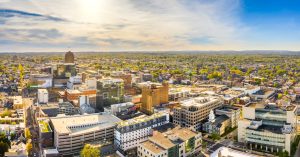By Thomas G. JeBran, President, Trans-Bridge Lines
Motorcoaches of today are not your grandfather’s “buses”. Today’s motorcoaches are comfortable, smoother riding, and loaded with safety equipment. Seatbelts, traction control, tire pressure monitoring systems, and anti-lock braking systems are included as standard equipment. Some coaches have 360-degree look-around cameras, forward-looking radar/braking, and anti-drifting systems.
Not only do these modern coaches have technological advances in comfort and safety, but they also have engines that are non-polluting.
Trans-Bridge Lines started using this type of engine in our buses starting in 2008. In 2010, we performed a ‘white glove test’. A white glove was held against the tailpipe of the bus with the engine running. When pulled away, there were no traces of any residue on the glove. This was filmed and reported by the local news stations and newspapers.
The engines since then are even cleaner and get more miles to the gallon. Motorcoaches are the most fuel-efficient form of transportation, getting 280.1 passenger miles per gallon, this is far better than rail at 89.9 passenger miles per gallon, and air travel at 56.6 passenger miles per gallon. (1)
Also, did you know that motorcoaches are the greenest form of transportation? Motorcoaches on average use the least amount of energy and produce the lowest carbon dioxide emissions per passenger than heavy rail, intercity rail, commuter rail, domestic air travel, trolley bus, light rail, ferry boat, and demand service vehicles.
CO2 emissions per passenger mile for motorcoaches are 36.7 CO2 /passenger miles, intercity rail 141.7 CO2 /passenger miles, and air travel 181.5 CO /passenger miles. (2)
Additionally, motorcoach travel helps ease congestion by taking up to 50 cars off the road for each bus load of passengers.
Scheduled service coaches provide major cities with commuter and regular service, and connect rural America. All of these services are operated with little or no government subsidies.
Motorcoach passenger service in our region is provided by Martz Trailways, Fullington Trailways, Greyhound, and Trans-Bridge Lines. Over the years many passengers were traveling to New York City, Newark Airport, JFK Airport, and the cruise terminals in Bayonne and Manhattan. However, we have been witnessing a downward trend in passenger counts since 2009. The introduction of video conferencing technology had enabled workers to spend less time in the office and travel less for meetings. That was pre-pandemic!
Now the technology has advanced significantly with Zoom, Teams, and other meeting hosts, allowing staff to be able to work and attend meetings from home. In the Northeast market, including New York City, we do not foresee the commuters returning to the office four or five days a week. While there are workers who need to be at their physical workplace daily, for instance, hospital staff and construction workers, others will continue to work remotely.
Trans-Bridge Lines is operating at one-third of pre-pandemic levels, which is on par with other motorcoach operators in the New York City market. Our company will slowly introduce extra services as demand increases from travelers and the national driver shortage is resolved resulting in increased staffing.
Even though the population of our region may continue to grow, many residents will find employment right here in our communities, work remotely from home, or commute to points along the Route 22, 78, and 287 corridors. However, those commutes will be limited to a fewer number of days per week in conjunction with remote work options.
Trans-Bridge Lines, our small family-owned business, has offered the Lehigh Valley area, and Bucks, Hunterdon, and Warren Counties frequent and reliable bus service without receiving operating subsidies from taxpayers for decades.
While we may never have the number of runs as we did pre-pandemic, our goal is to rebuild the bus transportation system and continue offering the residents of our community a secure and dependable form of travel.
These are just a few compelling reasons why using private motorcoach transportation is the best choice. Comfort, convenience, and the positive effect that traveling by motorcoach has on the environment and traffic congestion are superior to all other forms of travel. Equally important, it also doesn’t cost local residents money through higher taxes for government subsidies.
1, 2 – Updated Comparisons of Energy Use and Emissions from Different Transportation Modes, June 2019, by M.J. Bradley & Associates.
Not only do these modern coaches have technological advances in comfort and safety, but they also have engines that are non-polluting.
Trans-Bridge Lines started using this type of engine in our buses starting in 2008. In 2010, we performed a ‘white glove test’. A white glove was held against the tailpipe of the bus with the engine running. When pulled away, there were no traces of any residue on the glove. This was filmed and reported by the local news stations and newspapers.
The engines since then are even cleaner and get more miles to the gallon. Motorcoaches are the most fuel-efficient form of transportation, getting 280.1 passenger miles per gallon, this is far better than rail at 89.9 passenger miles per gallon, and air travel at 56.6 passenger miles per gallon. (1)
Also, did you know that motorcoaches are the greenest form of transportation? Motorcoaches on average use the least amount of energy and produce the lowest carbon dioxide emissions per passenger than heavy rail, intercity rail, commuter rail, domestic air travel, trolley bus, light rail, ferry boat, and demand service vehicles.
CO2 emissions per passenger mile for motorcoaches are 36.7 CO2 /passenger miles, intercity rail 141.7 CO2 /passenger miles, and air travel 181.5 CO /passenger miles. (2)
Additionally, motorcoach travel helps ease congestion by taking up to 50 cars off the road for each bus load of passengers.
Scheduled service coaches provide major cities with commuter and regular service, and connect rural America. All of these services are operated with little or no government subsidies.
Motorcoach passenger service in our region is provided by Martz Trailways, Fullington Trailways, Greyhound, and Trans-Bridge Lines. Over the years many passengers were traveling to New York City, Newark Airport, JFK Airport, and the cruise terminals in Bayonne and Manhattan. However, we have been witnessing a downward trend in passenger counts since 2009. The introduction of video conferencing technology had enabled workers to spend less time in the office and travel less for meetings. That was pre-pandemic!
Now the technology has advanced significantly with Zoom, Teams, and other meeting hosts, allowing staff to be able to work and attend meetings from home. In the Northeast market, including New York City, we do not foresee the commuters returning to the office four or five days a week. While there are workers who need to be at their physical workplace daily, for instance, hospital staff and construction workers, others will continue to work remotely.
Trans-Bridge Lines is operating at one-third of pre-pandemic levels, which is on par with other motorcoach operators in the New York City market. Our company will slowly introduce extra services as demand increases from travelers and the national driver shortage is resolved resulting in increased staffing.
Even though the population of our region may continue to grow, many residents will find employment right here in our communities, work remotely from home, or commute to points along the Route 22, 78, and 287 corridors. However, those commutes will be limited to a fewer number of days per week in conjunction with remote work options.
Trans-Bridge Lines, our small family-owned business, has offered the Lehigh Valley area, and Bucks, Hunterdon, and Warren Counties frequent and reliable bus service without receiving operating subsidies from taxpayers for decades.
While we may never have the number of runs as we did pre-pandemic, our goal is to rebuild the bus transportation system and continue offering the residents of our community a secure and dependable form of travel.
These are just a few compelling reasons why using private motorcoach transportation is the best choice. Comfort, convenience, and the positive effect that traveling by motorcoach has on the environment and traffic congestion are superior to all other forms of travel. Equally important, it also doesn’t cost local residents money through higher taxes for government subsidies.
1, 2 – Updated Comparisons of Energy Use and Emissions from Different Transportation Modes, June 2019, by M.J. Bradley & Associates.




